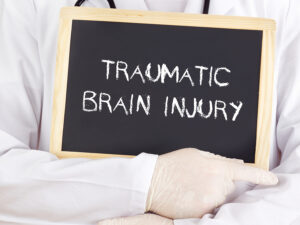Traumatic Brain Injuries: A Caregiver’s Guide
Brain Injury Awareness Month is recognized in March. So this is a good time to reflect on why brain injuries occur and how to manage them.
Falls that involve hitting one’s head are the most common reason that older people develop traumatic brain injury. According to the Centers for Disease Control (CDC), there was a seventeen percent hike in the incidence of deaths due to traumatic brain injuries in the period of 2008 to 2017. And a great many of those deaths were in the over 75 age group.
What Should You Do If Your Senior Hits His Head?

Home Health Care Arlington, VA: Brain Injuries
If your mother or father falls or otherwise hits his or her head, it is important to consult a doctor immediately. Symptoms of TBI do not necessarily present right away. A senior could, in other words, be badly injured without displaying symptoms. Symptoms are often delayed, but the injury could cause a fast downward progression.
It’s also a good idea to make a mental note of details about the injurious event. Try to determine how far your senior fell, what part of the head took the impact, whether and for how long she was unconscious, and whether she has symptoms like slurred speech or confusion. The doctor will want to know these details in order to determine how bad the injury is.
Diagnosis
A TBI can only be diagnosed in a clinical setting and it usually involves a CTI (computerized tomography imaging scan). This scan can and should be done in an emergency room if a patient enters with a head injury.
Head injuries often cause swelling in the brain. To assess the amount of swelling, a doctor may insert a probe into the patient’s head. This is called intracranial pressure monitoring.
Treatment for TBI
Mild brain injuries require no dramatic treatments, but the patient needs to be monitored at home for several days. And the patient needs to rest during that time. A home health care aide can help with monitoring and ensuring your parent doesn’t overdo it during the days following a head injury.
In the case of a more severe injury, the patient will need to be monitored in the hospital to make sure that he or she gets enough oxygen and that blood pressure continues as normal. If the patient has other injuries, he or she may need a blood infusion.
A doctor may decide to put the patient in a coma to preserve brain function, especially if the patient’s blood vessels are having difficulty transporting oxygen to the brain. The patient may receive diuretics which expel excess fluid through the patient’s urine. This relieves pressure on the skull due to swelling.
In severe cases of TBI, the patient may need surgery to remove a blood clot, repair a skull fracture, or fix a brain bleed.
In conclusion, traumatic brain injuries occur in the elderly usually as a result of a fall. It’s important to take immediate action to make sure that the injury gets the right treatment. Immediate treatment is the best chance of preserving brain function. A home health care agency can help adult children monitor their parents, prevent falls from happening, and get a patient to the hospital in a timely manner when needed.
If you or an aging loved-one is considering home health care in Arlington, VA please contact the caring staff at Thrive Health Care Services today. (703) 992-0484
Sources
https://www.cdc.gov/mmwr/volumes/69/wr/mm6909a1.htm#:~:text=Brain%20Injury%20Awareness%20Month%2C%20recognized,with%20TBI%20and%20their%20families.
https://www.mayoclinic.org/diseases-conditions/traumatic-brain-injury/diagnosis-treatment/drc-20378561
